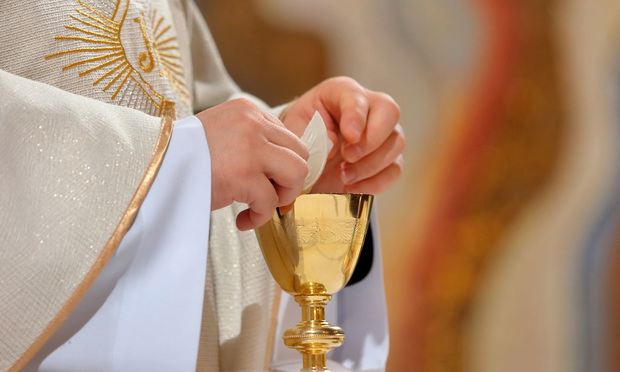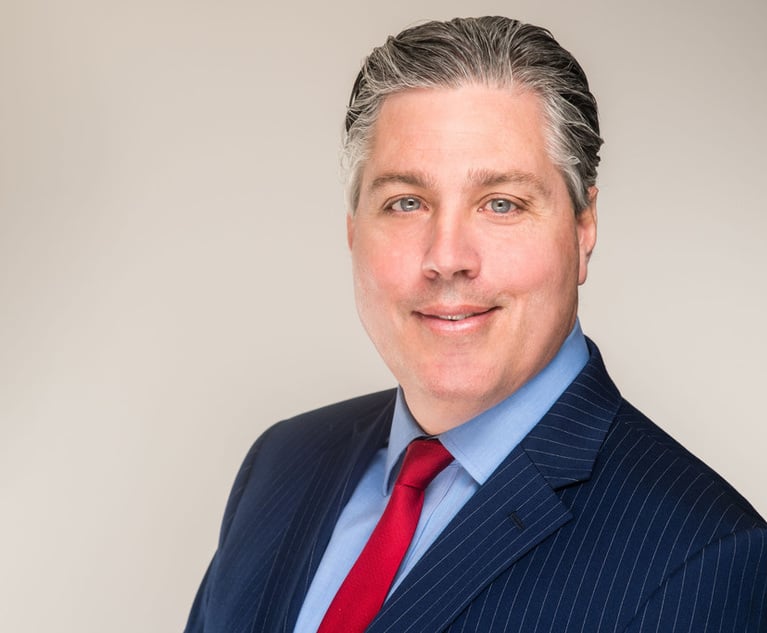Pa. Supreme Court Weighs Naming Names in Grand Jury Child Abuse Report
The Pennsylvania Supreme Court on Wednesday continued to wrestle with the implications of the explosive grand jury report into child sex abuse in the Catholic Church as it heard arguments over whether the state attorney general should be cleared to release the names of church officials named in the document.
September 26, 2018 at 04:20 PM
5 minute read
 Photo: Shutterstock
Photo: Shutterstock
The Pennsylvania Supreme Court on Wednesday continued to wrestle with the implications of the explosive grand jury report into child sex abuse in the Catholic Church as it heard arguments over whether the state attorney general should be cleared to release the names of church officials named in the document.
Attorneys for persons whose names have been so far redacted from the public version of the report are asking the court to keep the names of their clients secret, and proposed some changes that could be made to the grand jury process going forward.
But some members of the high court pushed back, saying the General Assembly sets the rules of grand jury proceedings, and that the court should think twice before allowing grand jury proceedings to be reshaped into trials.
The grand jury report, released last month, documented thousands of instances of child sex abuse perpetrated by more than 300 priests dating back 70 years.
However, before it was released, the Supreme Court agreed to redact the report to remove the names of several challengers, who claimed they were named in the report, but were not given the ability to rebut the claims.
The argument in the case—captioned In re 40th Investigating Grand Jury—turned on a discussion of the Supreme Court's power over the grand jury process, and safeguards for due process.
According to the attorneys for persons objecting to the release of names, the full report should remain under wraps, and the high court should make new rules so those named in the report can cross-examine witnesses before the supervising judge and appear before the grand jurors to present evidence.
Attorney Justin Danilewitz of Saul Ewing, who, along with Christopher Hall, argued for the unnamed persons, said they should remain anonymous, and the changes would allow future subjects of grand jury proceedings to be ”part of a vigorous process.”
One justice said the court can't on its own change statutes governing grand jury procedures.
“On what authority can we change the statute?” Justice Debra Todd asked. “That requires a legislative function to rewrite the statute and that we do not do.”
Justice Max Baer also said the requests could reshape proceedings before an investigative grand jury into a trial. He further seemed skeptical of the argument that the challengers would suffer reputational harm if the report was released.
“The average Pennsylvanian can't name five priests who were implicated,” Baer said. “This is not Bill Cosby. This is not Jerry Sandusky. These are just another one of the 300 priests who were implicated.”
Pennsylvania's report was the most comprehensive investigation into child sex abuse allegations in the country, and its release led several states, including New York, to launch similar investigations. It also sparked an international debate about accountability for child sexual abuse, which has received attention from Pope Francis, and, most recently, resulted in a bill being passed by the Pennsylvania House of Representatives that would extend the statute of limitations for accusers to sue abusers.
Baer noted the recent legislative action, and asked how changes that allow victims to sue their abusers would not moot the challengers' arguments, since, if the bill becomes law, they could be sued and then given their day in court to respond to the allegations publicly.
Danilewitz responded that some of the allegations are so thin that “no self-respecting” attorney would bring the claims.
Danilewitz said he recognized the “heightened sensitivity” regarding the separation of powers issues, and said that part of what his clients are hoping to get from the court is a recommendation that the legislature needs to rewrite the statute to allow for more due process protections.
Hall focused his time on persuading the court that the names also did not need to be released because the report has already accomplished the goals for grand jury reports.
During the state's rebuttal, Justice David Wecht asked why prosecutors needed to press for the release of the names instead of “getting some better law from Harrisburg.” Prosecutors, he suggested, could use the fact that not all of the names were released as a reason that the law needs to be fixed.
Ron Eisenberg, who represented the office of state Attorney General Josh Shapiro during the arguments, disagreed sharply on that point, and said that, allowing the names to be released would make the grand jury report the last effective grand jury report in the state.
“That would prevent us from [releasing names] in any other case. … It would be prevented under the constitution,” Eisenberg said. “That would be the last one.”
The AG's office has also proposed changes to the grand jury process, and said the justices could allow the parties to present the case anew before another grand jury. During that process, he said, the challengers should be allowed to testify before the jurors and submit a report, which the jurors can read before making their final report.
Eisenberg said he believed the court has the power to make the changes under its rule-making powers, although he admitted that there is some dispute about where the line falls between the court's rule-making powers and legislating from the bench, which would violate the separation of powers doctrine.
This content has been archived. It is available through our partners, LexisNexis® and Bloomberg Law.
To view this content, please continue to their sites.
Not a Lexis Subscriber?
Subscribe Now
Not a Bloomberg Law Subscriber?
Subscribe Now
NOT FOR REPRINT
© 2025 ALM Global, LLC, All Rights Reserved. Request academic re-use from www.copyright.com. All other uses, submit a request to [email protected]. For more information visit Asset & Logo Licensing.
You Might Like
View All


Feasting, Pledging, and Wagering, Philly Attorneys Prepare for Super Bowl
3 minute read
TikTok Opts Not to Take Section 230 Immunity Fight to U.S. Supreme Court
4 minute readTrending Stories
- 1States Accuse Trump of Thwarting Court's Funding Restoration Order
- 2Microsoft Becomes Latest Tech Company to Face Claims of Stealing Marketing Commissions From Influencers
- 3Coral Gables Attorney Busted for Stalking Lawyer
- 4Trump's DOJ Delays Releasing Jan. 6 FBI Agents List Under Consent Order
- 5Securities Report Says That 2024 Settlements Passed a Total of $5.2B
Who Got The Work
J. Brugh Lower of Gibbons has entered an appearance for industrial equipment supplier Devco Corporation in a pending trademark infringement lawsuit. The suit, accusing the defendant of selling knock-off Graco products, was filed Dec. 18 in New Jersey District Court by Rivkin Radler on behalf of Graco Inc. and Graco Minnesota. The case, assigned to U.S. District Judge Zahid N. Quraishi, is 3:24-cv-11294, Graco Inc. et al v. Devco Corporation.
Who Got The Work
Rebecca Maller-Stein and Kent A. Yalowitz of Arnold & Porter Kaye Scholer have entered their appearances for Hanaco Venture Capital and its executives, Lior Prosor and David Frankel, in a pending securities lawsuit. The action, filed on Dec. 24 in New York Southern District Court by Zell, Aron & Co. on behalf of Goldeneye Advisors, accuses the defendants of negligently and fraudulently managing the plaintiff's $1 million investment. The case, assigned to U.S. District Judge Vernon S. Broderick, is 1:24-cv-09918, Goldeneye Advisors, LLC v. Hanaco Venture Capital, Ltd. et al.
Who Got The Work
Attorneys from A&O Shearman has stepped in as defense counsel for Toronto-Dominion Bank and other defendants in a pending securities class action. The suit, filed Dec. 11 in New York Southern District Court by Bleichmar Fonti & Auld, accuses the defendants of concealing the bank's 'pervasive' deficiencies in regards to its compliance with the Bank Secrecy Act and the quality of its anti-money laundering controls. The case, assigned to U.S. District Judge Arun Subramanian, is 1:24-cv-09445, Gonzalez v. The Toronto-Dominion Bank et al.
Who Got The Work
Crown Castle International, a Pennsylvania company providing shared communications infrastructure, has turned to Luke D. Wolf of Gordon Rees Scully Mansukhani to fend off a pending breach-of-contract lawsuit. The court action, filed Nov. 25 in Michigan Eastern District Court by Hooper Hathaway PC on behalf of The Town Residences LLC, accuses Crown Castle of failing to transfer approximately $30,000 in utility payments from T-Mobile in breach of a roof-top lease and assignment agreement. The case, assigned to U.S. District Judge Susan K. Declercq, is 2:24-cv-13131, The Town Residences LLC v. T-Mobile US, Inc. et al.
Who Got The Work
Wilfred P. Coronato and Daniel M. Schwartz of McCarter & English have stepped in as defense counsel to Electrolux Home Products Inc. in a pending product liability lawsuit. The court action, filed Nov. 26 in New York Eastern District Court by Poulos Lopiccolo PC and Nagel Rice LLP on behalf of David Stern, alleges that the defendant's refrigerators’ drawers and shelving repeatedly break and fall apart within months after purchase. The case, assigned to U.S. District Judge Joan M. Azrack, is 2:24-cv-08204, Stern v. Electrolux Home Products, Inc.





